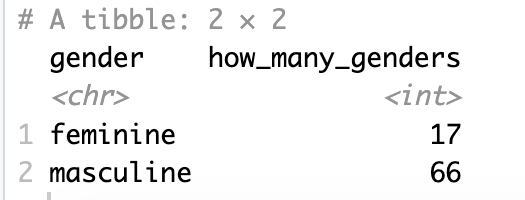Hey everyone, beginner to R. Just wondering, why doesn't the count() function work as an argument in the summarize() function, but n() does? Isn't the entire point of count to count? It kind of threw me off.
Example with count():
starwars %>%
Result:
Error
Example with n():
starwars %>%
Result:
startz
May 26, 2024, 11:41pm
2
count() returns a dataframe, which isn't what you want inside summarize().
2 Likes
Thank you! I didn't know count's purpose was to return data frames and that it was actually n() function to count rows. Could you show an example with the count function?
startz
May 27, 2024, 12:13am
4
Take a look at the help file with ?count. But here's a very simple example.
>library(tidyverse)
> t <- tibble(variable = 1:10)
> count(t)
# A tibble: 1 × 1
n
<int>
1 10
1 Like
The function count() is NOT used within summarize. I think what you want is this:
library(tidyverse)
starwars %>%
drop_na(gender) %>%
count(gender, name="how_many_genders")
#> # A tibble: 2 × 2
#> gender how_many_genders
#> <chr> <int>
#> 1 feminine 17
#> 2 masculine 66
starwars %>%
drop_na(gender) %>%
group_by(gender) %>%
summarize(how_many_genders= n())
#> # A tibble: 2 × 2
#> gender how_many_genders
#> <chr> <int>
#> 1 feminine 17
#> 2 masculine 66
Created on 2024-05-28 with reprex v2.1.0
3 Likes
system
August 26, 2024, 1:12pm
6
This topic was automatically closed 90 days after the last reply. New replies are no longer allowed.
